HLT301 Assessment Task 3 Workbook: Mental State Evaluation
VerifiedAdded on 2023/03/31
|11
|2191
|300
Report
AI Summary
This report analyzes a mental state assessment workbook for the HLT301 course. The workbook defines mental state assessments and their usefulness, describes a patient's appearance, behavior, speech, and physiological symptoms related to depression. It differentiates between mood and affect, assesses the patient's thought process, and explores the importance of past substance abuse history. The report outlines the patient's risks, including a history of depression, low socioeconomic status, and sleep disorders. Furthermore, the report details appropriate interventions and treatment options, including psychological treatments like cognitive behavior therapy and antidepressant medications, along with the rationale for each approach. The report also provides a detailed reference list. The assessment also considers the setting in which care might be provided and emphasizes the importance of an active lifestyle, improved sleeping patterns, and support in managing the patient's depression.
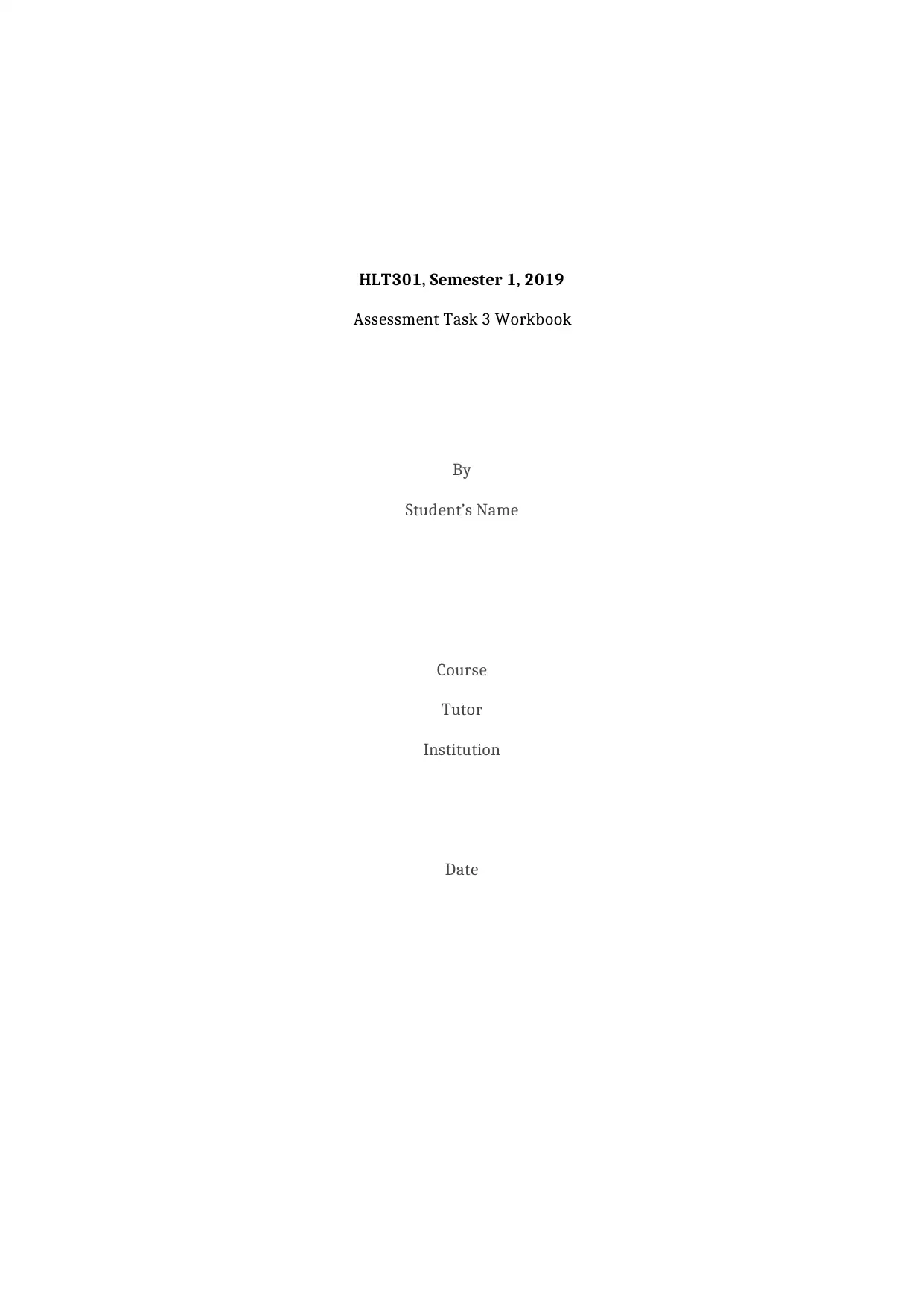
HLT301, Semester 1, 2019
Assessment Task 3 Workbook
By
Student’s Name
Course
Tutor
Institution
Date
Assessment Task 3 Workbook
By
Student’s Name
Course
Tutor
Institution
Date
Paraphrase This Document
Need a fresh take? Get an instant paraphrase of this document with our AI Paraphraser
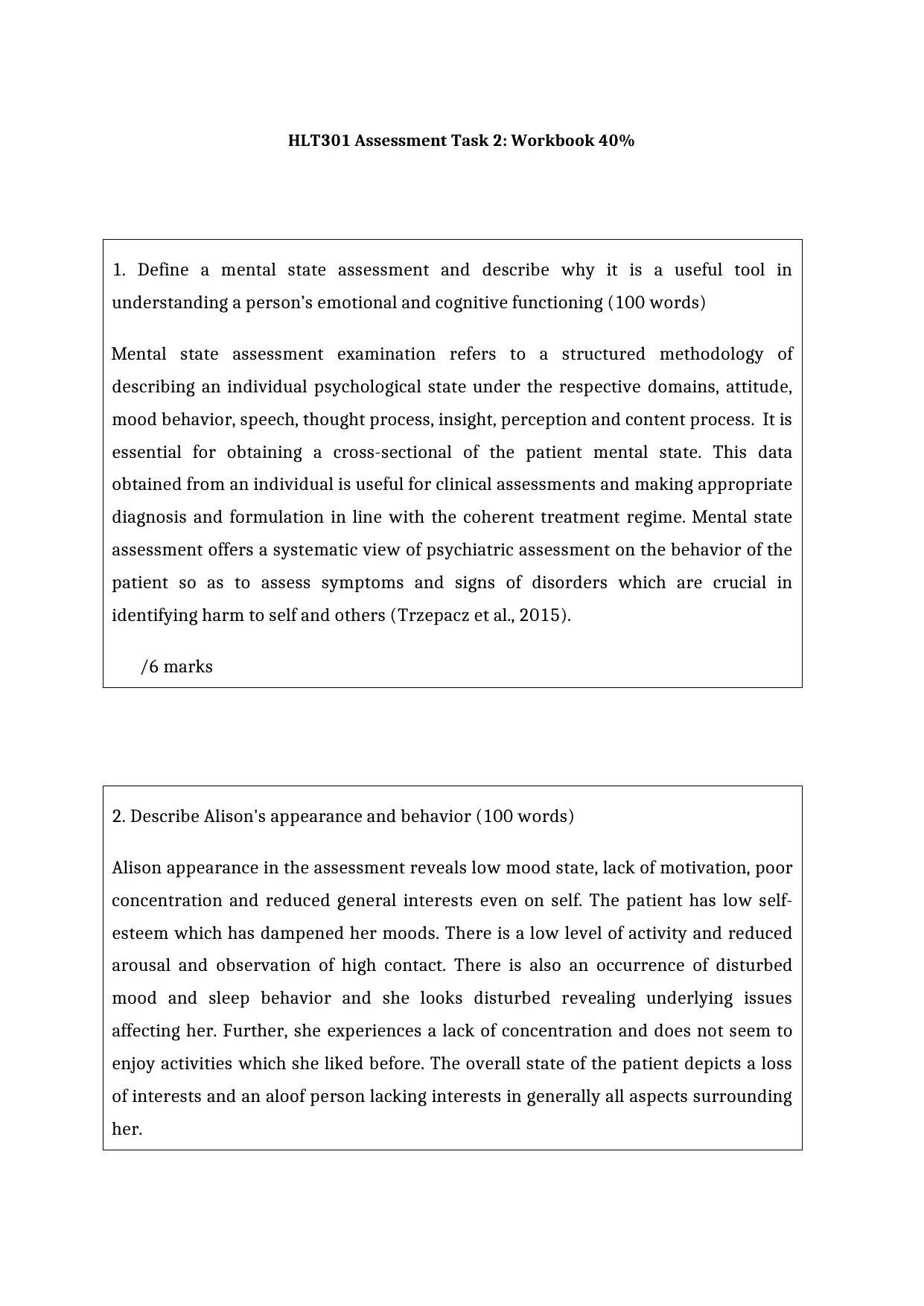
HLT301 Assessment Task 2: Workbook 40%
1. Define a mental state assessment and describe why it is a useful tool in
understanding a person’s emotional and cognitive functioning (100 words)
Mental state assessment examination refers to a structured methodology of
describing an individual psychological state under the respective domains, attitude,
mood behavior, speech, thought process, insight, perception and content process. It is
essential for obtaining a cross-sectional of the patient mental state. This data
obtained from an individual is useful for clinical assessments and making appropriate
diagnosis and formulation in line with the coherent treatment regime. Mental state
assessment offers a systematic view of psychiatric assessment on the behavior of the
patient so as to assess symptoms and signs of disorders which are crucial in
identifying harm to self and others (Trzepacz et al., 2015).
/6 marks
2. Describe Alison's appearance and behavior (100 words)
Alison appearance in the assessment reveals low mood state, lack of motivation, poor
concentration and reduced general interests even on self. The patient has low self-
esteem which has dampened her moods. There is a low level of activity and reduced
arousal and observation of high contact. There is also an occurrence of disturbed
mood and sleep behavior and she looks disturbed revealing underlying issues
affecting her. Further, she experiences a lack of concentration and does not seem to
enjoy activities which she liked before. The overall state of the patient depicts a loss
of interests and an aloof person lacking interests in generally all aspects surrounding
her.
1. Define a mental state assessment and describe why it is a useful tool in
understanding a person’s emotional and cognitive functioning (100 words)
Mental state assessment examination refers to a structured methodology of
describing an individual psychological state under the respective domains, attitude,
mood behavior, speech, thought process, insight, perception and content process. It is
essential for obtaining a cross-sectional of the patient mental state. This data
obtained from an individual is useful for clinical assessments and making appropriate
diagnosis and formulation in line with the coherent treatment regime. Mental state
assessment offers a systematic view of psychiatric assessment on the behavior of the
patient so as to assess symptoms and signs of disorders which are crucial in
identifying harm to self and others (Trzepacz et al., 2015).
/6 marks
2. Describe Alison's appearance and behavior (100 words)
Alison appearance in the assessment reveals low mood state, lack of motivation, poor
concentration and reduced general interests even on self. The patient has low self-
esteem which has dampened her moods. There is a low level of activity and reduced
arousal and observation of high contact. There is also an occurrence of disturbed
mood and sleep behavior and she looks disturbed revealing underlying issues
affecting her. Further, she experiences a lack of concentration and does not seem to
enjoy activities which she liked before. The overall state of the patient depicts a loss
of interests and an aloof person lacking interests in generally all aspects surrounding
her.
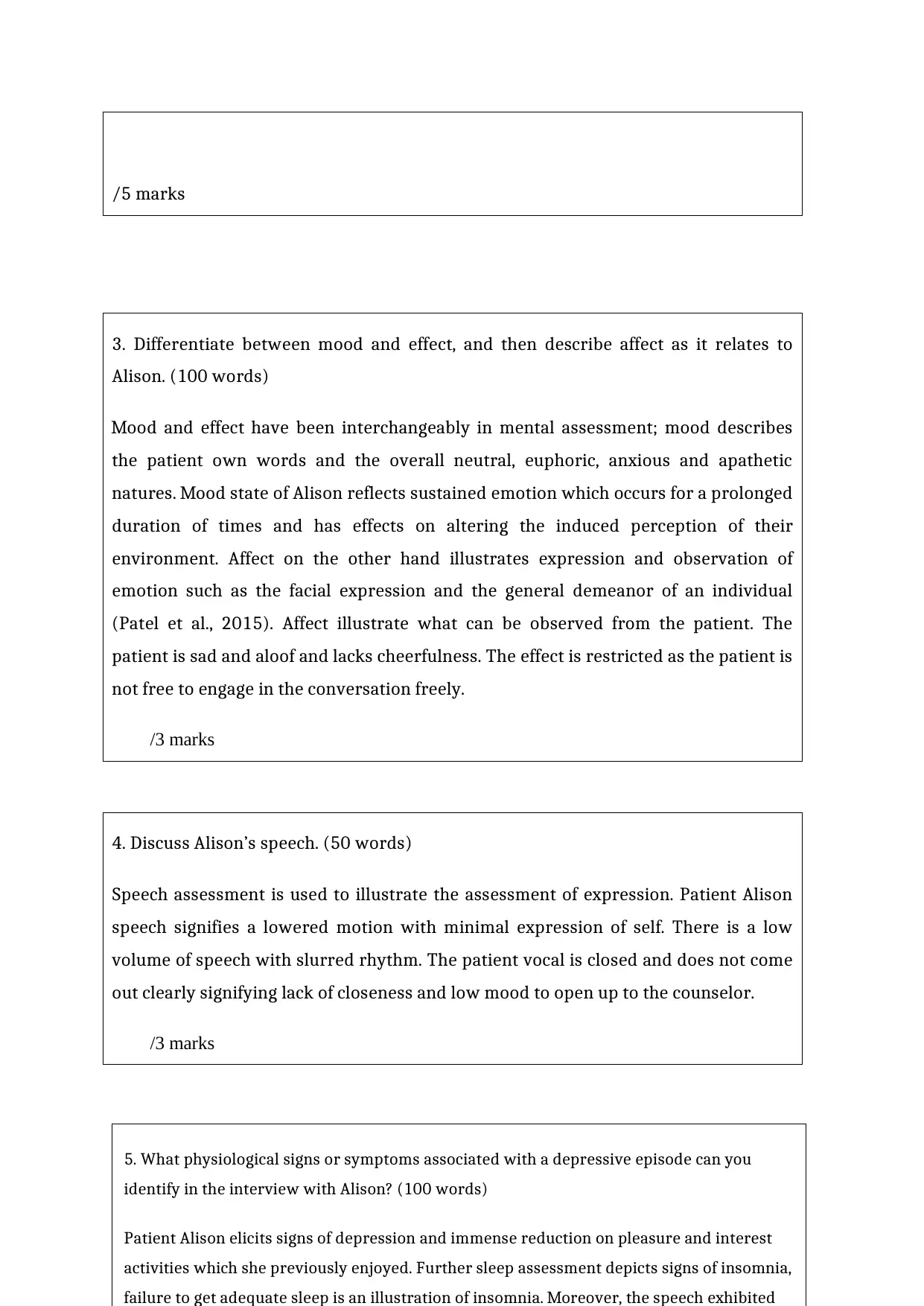
/5 marks
3. Differentiate between mood and effect, and then describe affect as it relates to
Alison. (100 words)
Mood and effect have been interchangeably in mental assessment; mood describes
the patient own words and the overall neutral, euphoric, anxious and apathetic
natures. Mood state of Alison reflects sustained emotion which occurs for a prolonged
duration of times and has effects on altering the induced perception of their
environment. Affect on the other hand illustrates expression and observation of
emotion such as the facial expression and the general demeanor of an individual
(Patel et al., 2015). Affect illustrate what can be observed from the patient. The
patient is sad and aloof and lacks cheerfulness. The effect is restricted as the patient is
not free to engage in the conversation freely.
/3 marks
4. Discuss Alison’s speech. (50 words)
Speech assessment is used to illustrate the assessment of expression. Patient Alison
speech signifies a lowered motion with minimal expression of self. There is a low
volume of speech with slurred rhythm. The patient vocal is closed and does not come
out clearly signifying lack of closeness and low mood to open up to the counselor.
/3 marks
5. What physiological signs or symptoms associated with a depressive episode can you
identify in the interview with Alison? (100 words)
Patient Alison elicits signs of depression and immense reduction on pleasure and interest
activities which she previously enjoyed. Further sleep assessment depicts signs of insomnia,
failure to get adequate sleep is an illustration of insomnia. Moreover, the speech exhibited
3. Differentiate between mood and effect, and then describe affect as it relates to
Alison. (100 words)
Mood and effect have been interchangeably in mental assessment; mood describes
the patient own words and the overall neutral, euphoric, anxious and apathetic
natures. Mood state of Alison reflects sustained emotion which occurs for a prolonged
duration of times and has effects on altering the induced perception of their
environment. Affect on the other hand illustrates expression and observation of
emotion such as the facial expression and the general demeanor of an individual
(Patel et al., 2015). Affect illustrate what can be observed from the patient. The
patient is sad and aloof and lacks cheerfulness. The effect is restricted as the patient is
not free to engage in the conversation freely.
/3 marks
4. Discuss Alison’s speech. (50 words)
Speech assessment is used to illustrate the assessment of expression. Patient Alison
speech signifies a lowered motion with minimal expression of self. There is a low
volume of speech with slurred rhythm. The patient vocal is closed and does not come
out clearly signifying lack of closeness and low mood to open up to the counselor.
/3 marks
5. What physiological signs or symptoms associated with a depressive episode can you
identify in the interview with Alison? (100 words)
Patient Alison elicits signs of depression and immense reduction on pleasure and interest
activities which she previously enjoyed. Further sleep assessment depicts signs of insomnia,
failure to get adequate sleep is an illustration of insomnia. Moreover, the speech exhibited
⊘ This is a preview!⊘
Do you want full access?
Subscribe today to unlock all pages.

Trusted by 1+ million students worldwide
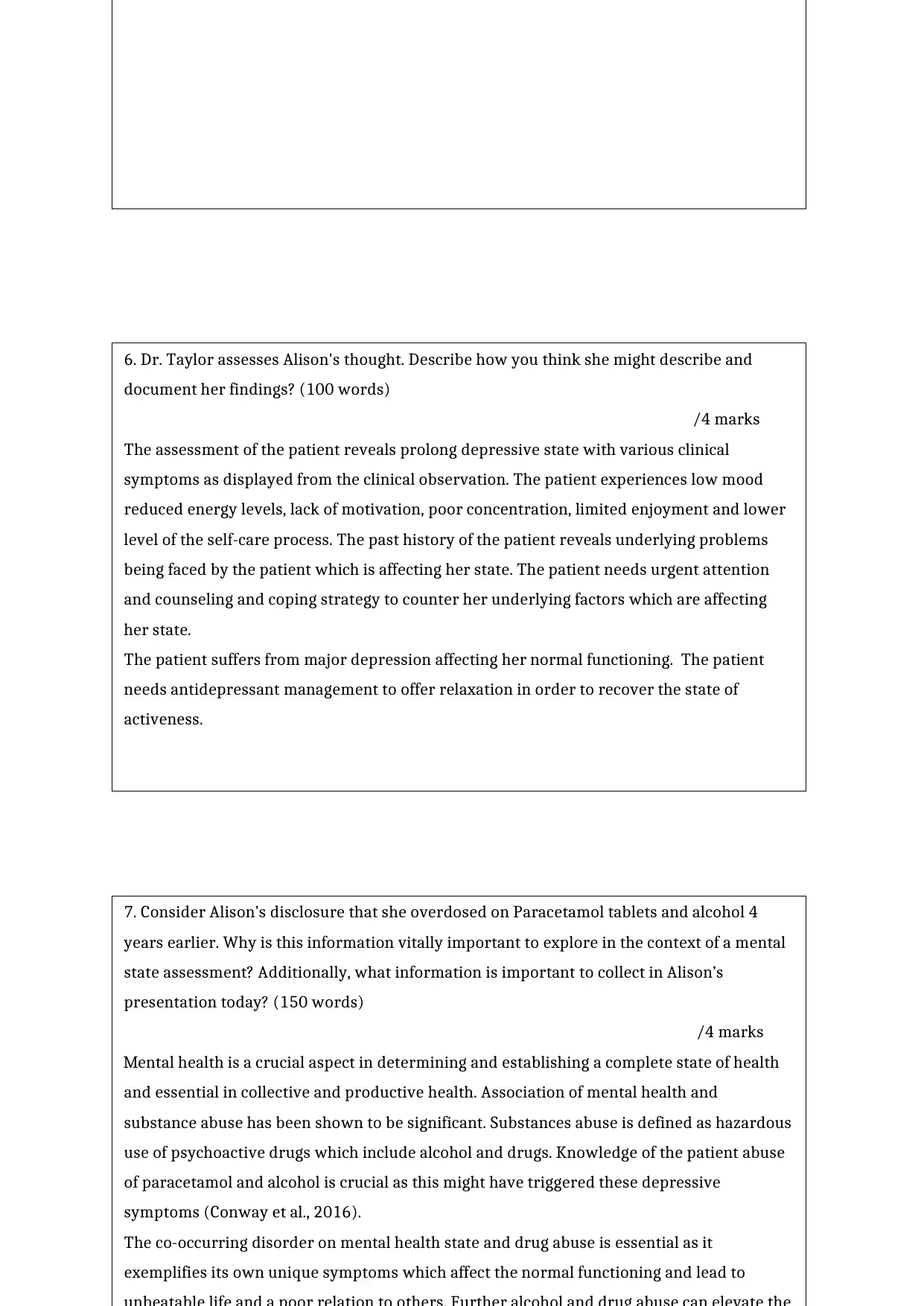
6. Dr. Taylor assesses Alison's thought. Describe how you think she might describe and
document her findings? (100 words)
/4 marks
The assessment of the patient reveals prolong depressive state with various clinical
symptoms as displayed from the clinical observation. The patient experiences low mood
reduced energy levels, lack of motivation, poor concentration, limited enjoyment and lower
level of the self-care process. The past history of the patient reveals underlying problems
being faced by the patient which is affecting her state. The patient needs urgent attention
and counseling and coping strategy to counter her underlying factors which are affecting
her state.
The patient suffers from major depression affecting her normal functioning. The patient
needs antidepressant management to offer relaxation in order to recover the state of
activeness.
7. Consider Alison’s disclosure that she overdosed on Paracetamol tablets and alcohol 4
years earlier. Why is this information vitally important to explore in the context of a mental
state assessment? Additionally, what information is important to collect in Alison’s
presentation today? (150 words)
/4 marks
Mental health is a crucial aspect in determining and establishing a complete state of health
and essential in collective and productive health. Association of mental health and
substance abuse has been shown to be significant. Substances abuse is defined as hazardous
use of psychoactive drugs which include alcohol and drugs. Knowledge of the patient abuse
of paracetamol and alcohol is crucial as this might have triggered these depressive
symptoms (Conway et al., 2016).
The co-occurring disorder on mental health state and drug abuse is essential as it
exemplifies its own unique symptoms which affect the normal functioning and lead to
document her findings? (100 words)
/4 marks
The assessment of the patient reveals prolong depressive state with various clinical
symptoms as displayed from the clinical observation. The patient experiences low mood
reduced energy levels, lack of motivation, poor concentration, limited enjoyment and lower
level of the self-care process. The past history of the patient reveals underlying problems
being faced by the patient which is affecting her state. The patient needs urgent attention
and counseling and coping strategy to counter her underlying factors which are affecting
her state.
The patient suffers from major depression affecting her normal functioning. The patient
needs antidepressant management to offer relaxation in order to recover the state of
activeness.
7. Consider Alison’s disclosure that she overdosed on Paracetamol tablets and alcohol 4
years earlier. Why is this information vitally important to explore in the context of a mental
state assessment? Additionally, what information is important to collect in Alison’s
presentation today? (150 words)
/4 marks
Mental health is a crucial aspect in determining and establishing a complete state of health
and essential in collective and productive health. Association of mental health and
substance abuse has been shown to be significant. Substances abuse is defined as hazardous
use of psychoactive drugs which include alcohol and drugs. Knowledge of the patient abuse
of paracetamol and alcohol is crucial as this might have triggered these depressive
symptoms (Conway et al., 2016).
The co-occurring disorder on mental health state and drug abuse is essential as it
exemplifies its own unique symptoms which affect the normal functioning and lead to
Paraphrase This Document
Need a fresh take? Get an instant paraphrase of this document with our AI Paraphraser
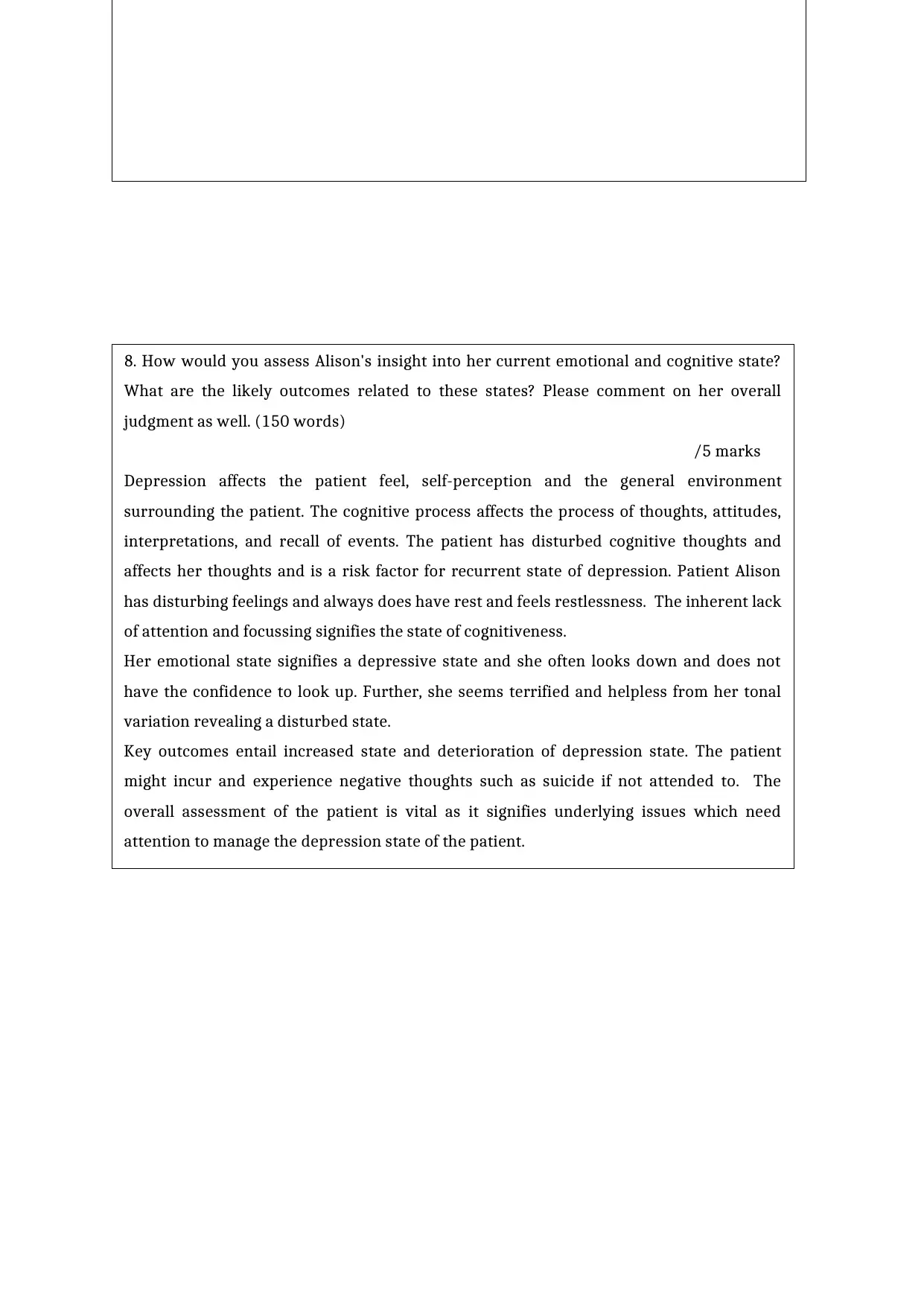
8. How would you assess Alison's insight into her current emotional and cognitive state?
What are the likely outcomes related to these states? Please comment on her overall
judgment as well. (150 words)
/5 marks
Depression affects the patient feel, self-perception and the general environment
surrounding the patient. The cognitive process affects the process of thoughts, attitudes,
interpretations, and recall of events. The patient has disturbed cognitive thoughts and
affects her thoughts and is a risk factor for recurrent state of depression. Patient Alison
has disturbing feelings and always does have rest and feels restlessness. The inherent lack
of attention and focussing signifies the state of cognitiveness.
Her emotional state signifies a depressive state and she often looks down and does not
have the confidence to look up. Further, she seems terrified and helpless from her tonal
variation revealing a disturbed state.
Key outcomes entail increased state and deterioration of depression state. The patient
might incur and experience negative thoughts such as suicide if not attended to. The
overall assessment of the patient is vital as it signifies underlying issues which need
attention to manage the depression state of the patient.
What are the likely outcomes related to these states? Please comment on her overall
judgment as well. (150 words)
/5 marks
Depression affects the patient feel, self-perception and the general environment
surrounding the patient. The cognitive process affects the process of thoughts, attitudes,
interpretations, and recall of events. The patient has disturbed cognitive thoughts and
affects her thoughts and is a risk factor for recurrent state of depression. Patient Alison
has disturbing feelings and always does have rest and feels restlessness. The inherent lack
of attention and focussing signifies the state of cognitiveness.
Her emotional state signifies a depressive state and she often looks down and does not
have the confidence to look up. Further, she seems terrified and helpless from her tonal
variation revealing a disturbed state.
Key outcomes entail increased state and deterioration of depression state. The patient
might incur and experience negative thoughts such as suicide if not attended to. The
overall assessment of the patient is vital as it signifies underlying issues which need
attention to manage the depression state of the patient.
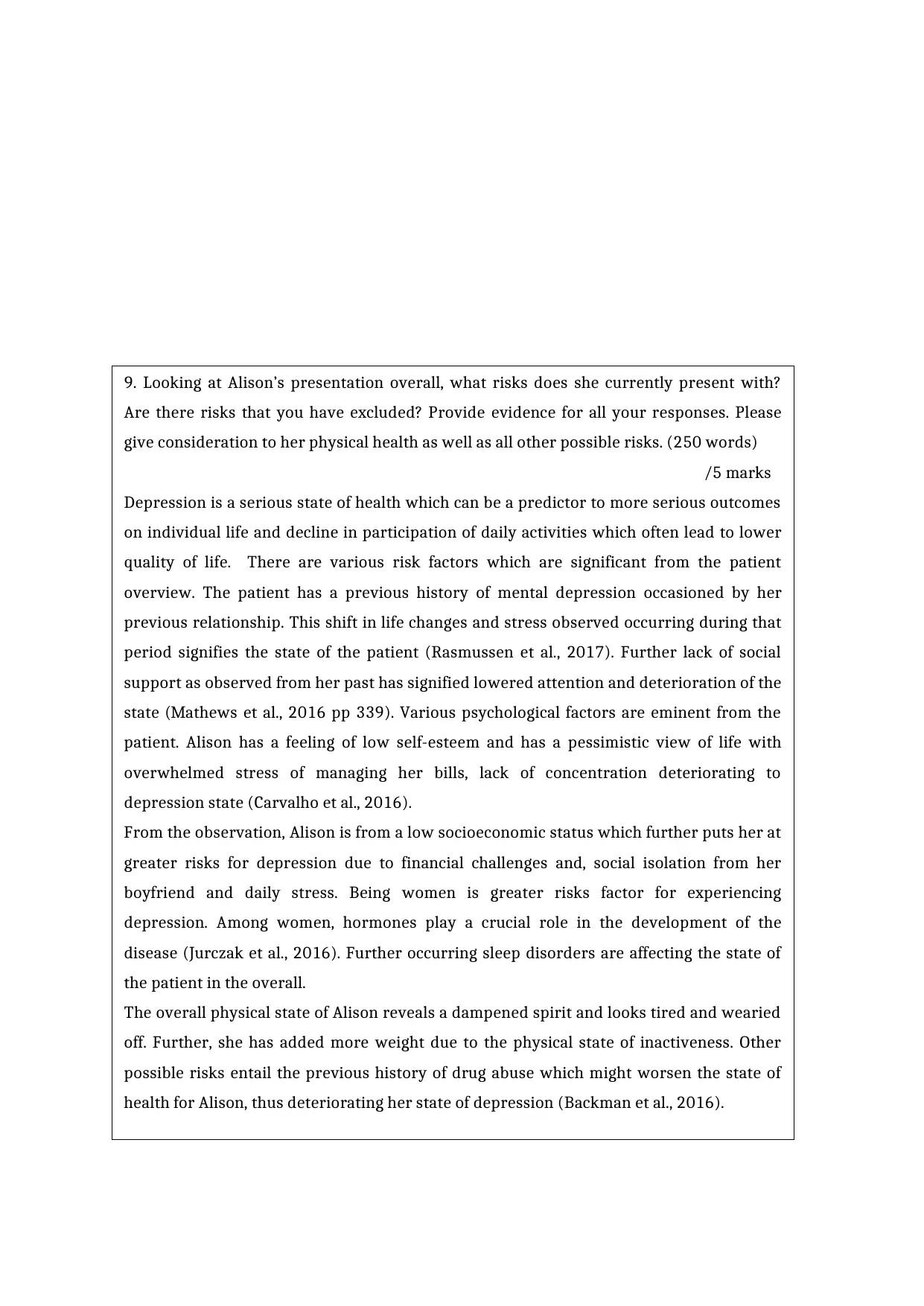
9. Looking at Alison’s presentation overall, what risks does she currently present with?
Are there risks that you have excluded? Provide evidence for all your responses. Please
give consideration to her physical health as well as all other possible risks. (250 words)
/5 marks
Depression is a serious state of health which can be a predictor to more serious outcomes
on individual life and decline in participation of daily activities which often lead to lower
quality of life. There are various risk factors which are significant from the patient
overview. The patient has a previous history of mental depression occasioned by her
previous relationship. This shift in life changes and stress observed occurring during that
period signifies the state of the patient (Rasmussen et al., 2017). Further lack of social
support as observed from her past has signified lowered attention and deterioration of the
state (Mathews et al., 2016 pp 339). Various psychological factors are eminent from the
patient. Alison has a feeling of low self-esteem and has a pessimistic view of life with
overwhelmed stress of managing her bills, lack of concentration deteriorating to
depression state (Carvalho et al., 2016).
From the observation, Alison is from a low socioeconomic status which further puts her at
greater risks for depression due to financial challenges and, social isolation from her
boyfriend and daily stress. Being women is greater risks factor for experiencing
depression. Among women, hormones play a crucial role in the development of the
disease (Jurczak et al., 2016). Further occurring sleep disorders are affecting the state of
the patient in the overall.
The overall physical state of Alison reveals a dampened spirit and looks tired and wearied
off. Further, she has added more weight due to the physical state of inactiveness. Other
possible risks entail the previous history of drug abuse which might worsen the state of
health for Alison, thus deteriorating her state of depression (Backman et al., 2016).
Are there risks that you have excluded? Provide evidence for all your responses. Please
give consideration to her physical health as well as all other possible risks. (250 words)
/5 marks
Depression is a serious state of health which can be a predictor to more serious outcomes
on individual life and decline in participation of daily activities which often lead to lower
quality of life. There are various risk factors which are significant from the patient
overview. The patient has a previous history of mental depression occasioned by her
previous relationship. This shift in life changes and stress observed occurring during that
period signifies the state of the patient (Rasmussen et al., 2017). Further lack of social
support as observed from her past has signified lowered attention and deterioration of the
state (Mathews et al., 2016 pp 339). Various psychological factors are eminent from the
patient. Alison has a feeling of low self-esteem and has a pessimistic view of life with
overwhelmed stress of managing her bills, lack of concentration deteriorating to
depression state (Carvalho et al., 2016).
From the observation, Alison is from a low socioeconomic status which further puts her at
greater risks for depression due to financial challenges and, social isolation from her
boyfriend and daily stress. Being women is greater risks factor for experiencing
depression. Among women, hormones play a crucial role in the development of the
disease (Jurczak et al., 2016). Further occurring sleep disorders are affecting the state of
the patient in the overall.
The overall physical state of Alison reveals a dampened spirit and looks tired and wearied
off. Further, she has added more weight due to the physical state of inactiveness. Other
possible risks entail the previous history of drug abuse which might worsen the state of
health for Alison, thus deteriorating her state of depression (Backman et al., 2016).
⊘ This is a preview!⊘
Do you want full access?
Subscribe today to unlock all pages.

Trusted by 1+ million students worldwide
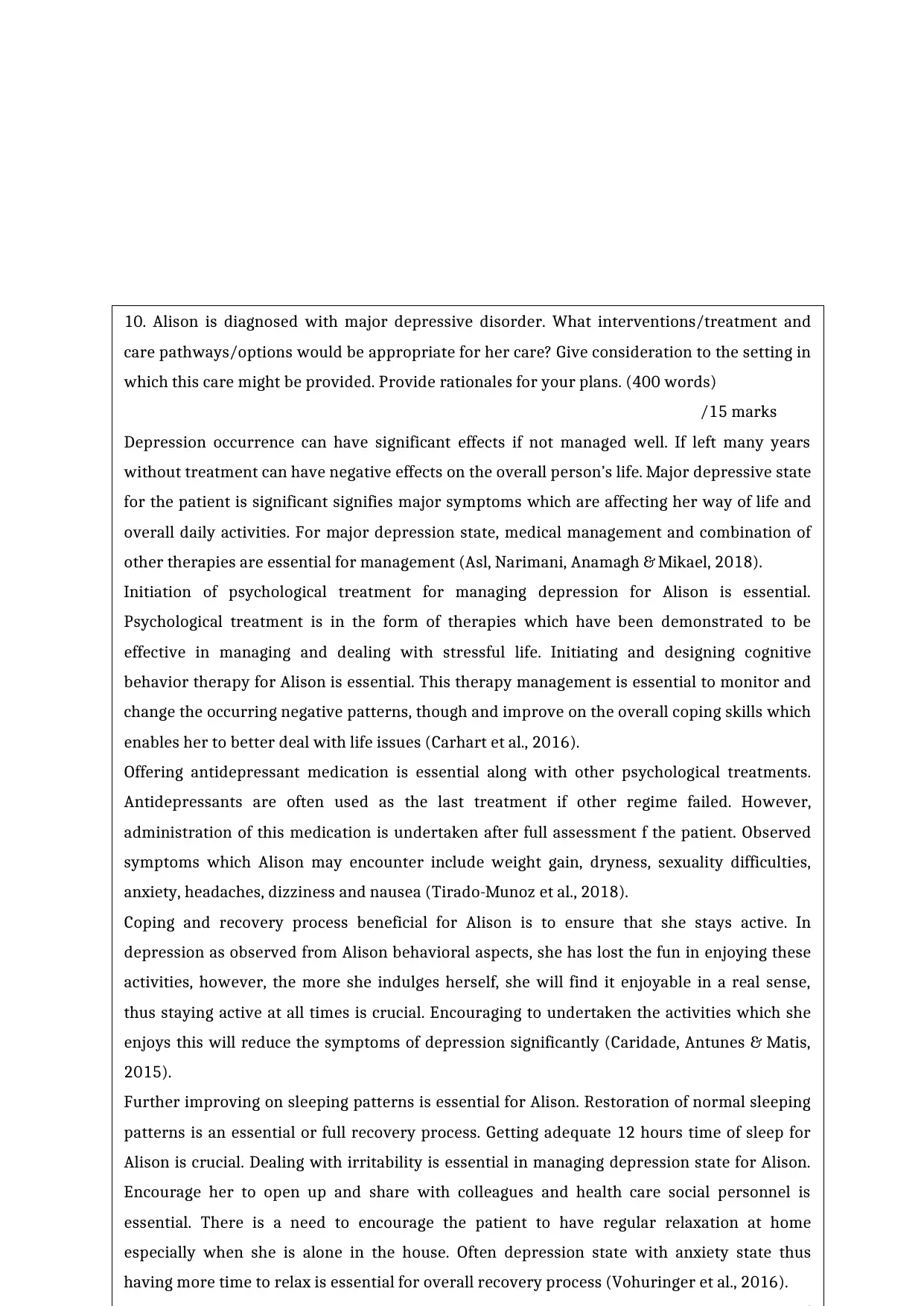
10. Alison is diagnosed with major depressive disorder. What interventions/treatment and
care pathways/options would be appropriate for her care? Give consideration to the setting in
which this care might be provided. Provide rationales for your plans. (400 words)
/15 marks
Depression occurrence can have significant effects if not managed well. If left many years
without treatment can have negative effects on the overall person’s life. Major depressive state
for the patient is significant signifies major symptoms which are affecting her way of life and
overall daily activities. For major depression state, medical management and combination of
other therapies are essential for management (Asl, Narimani, Anamagh & Mikael, 2018).
Initiation of psychological treatment for managing depression for Alison is essential.
Psychological treatment is in the form of therapies which have been demonstrated to be
effective in managing and dealing with stressful life. Initiating and designing cognitive
behavior therapy for Alison is essential. This therapy management is essential to monitor and
change the occurring negative patterns, though and improve on the overall coping skills which
enables her to better deal with life issues (Carhart et al., 2016).
Offering antidepressant medication is essential along with other psychological treatments.
Antidepressants are often used as the last treatment if other regime failed. However,
administration of this medication is undertaken after full assessment f the patient. Observed
symptoms which Alison may encounter include weight gain, dryness, sexuality difficulties,
anxiety, headaches, dizziness and nausea (Tirado-Munoz et al., 2018).
Coping and recovery process beneficial for Alison is to ensure that she stays active. In
depression as observed from Alison behavioral aspects, she has lost the fun in enjoying these
activities, however, the more she indulges herself, she will find it enjoyable in a real sense,
thus staying active at all times is crucial. Encouraging to undertaken the activities which she
enjoys this will reduce the symptoms of depression significantly (Caridade, Antunes & Matis,
2015).
Further improving on sleeping patterns is essential for Alison. Restoration of normal sleeping
patterns is an essential or full recovery process. Getting adequate 12 hours time of sleep for
Alison is crucial. Dealing with irritability is essential in managing depression state for Alison.
Encourage her to open up and share with colleagues and health care social personnel is
essential. There is a need to encourage the patient to have regular relaxation at home
especially when she is alone in the house. Often depression state with anxiety state thus
having more time to relax is essential for overall recovery process (Vohuringer et al., 2016).
care pathways/options would be appropriate for her care? Give consideration to the setting in
which this care might be provided. Provide rationales for your plans. (400 words)
/15 marks
Depression occurrence can have significant effects if not managed well. If left many years
without treatment can have negative effects on the overall person’s life. Major depressive state
for the patient is significant signifies major symptoms which are affecting her way of life and
overall daily activities. For major depression state, medical management and combination of
other therapies are essential for management (Asl, Narimani, Anamagh & Mikael, 2018).
Initiation of psychological treatment for managing depression for Alison is essential.
Psychological treatment is in the form of therapies which have been demonstrated to be
effective in managing and dealing with stressful life. Initiating and designing cognitive
behavior therapy for Alison is essential. This therapy management is essential to monitor and
change the occurring negative patterns, though and improve on the overall coping skills which
enables her to better deal with life issues (Carhart et al., 2016).
Offering antidepressant medication is essential along with other psychological treatments.
Antidepressants are often used as the last treatment if other regime failed. However,
administration of this medication is undertaken after full assessment f the patient. Observed
symptoms which Alison may encounter include weight gain, dryness, sexuality difficulties,
anxiety, headaches, dizziness and nausea (Tirado-Munoz et al., 2018).
Coping and recovery process beneficial for Alison is to ensure that she stays active. In
depression as observed from Alison behavioral aspects, she has lost the fun in enjoying these
activities, however, the more she indulges herself, she will find it enjoyable in a real sense,
thus staying active at all times is crucial. Encouraging to undertaken the activities which she
enjoys this will reduce the symptoms of depression significantly (Caridade, Antunes & Matis,
2015).
Further improving on sleeping patterns is essential for Alison. Restoration of normal sleeping
patterns is an essential or full recovery process. Getting adequate 12 hours time of sleep for
Alison is crucial. Dealing with irritability is essential in managing depression state for Alison.
Encourage her to open up and share with colleagues and health care social personnel is
essential. There is a need to encourage the patient to have regular relaxation at home
especially when she is alone in the house. Often depression state with anxiety state thus
having more time to relax is essential for overall recovery process (Vohuringer et al., 2016).
Paraphrase This Document
Need a fresh take? Get an instant paraphrase of this document with our AI Paraphraser

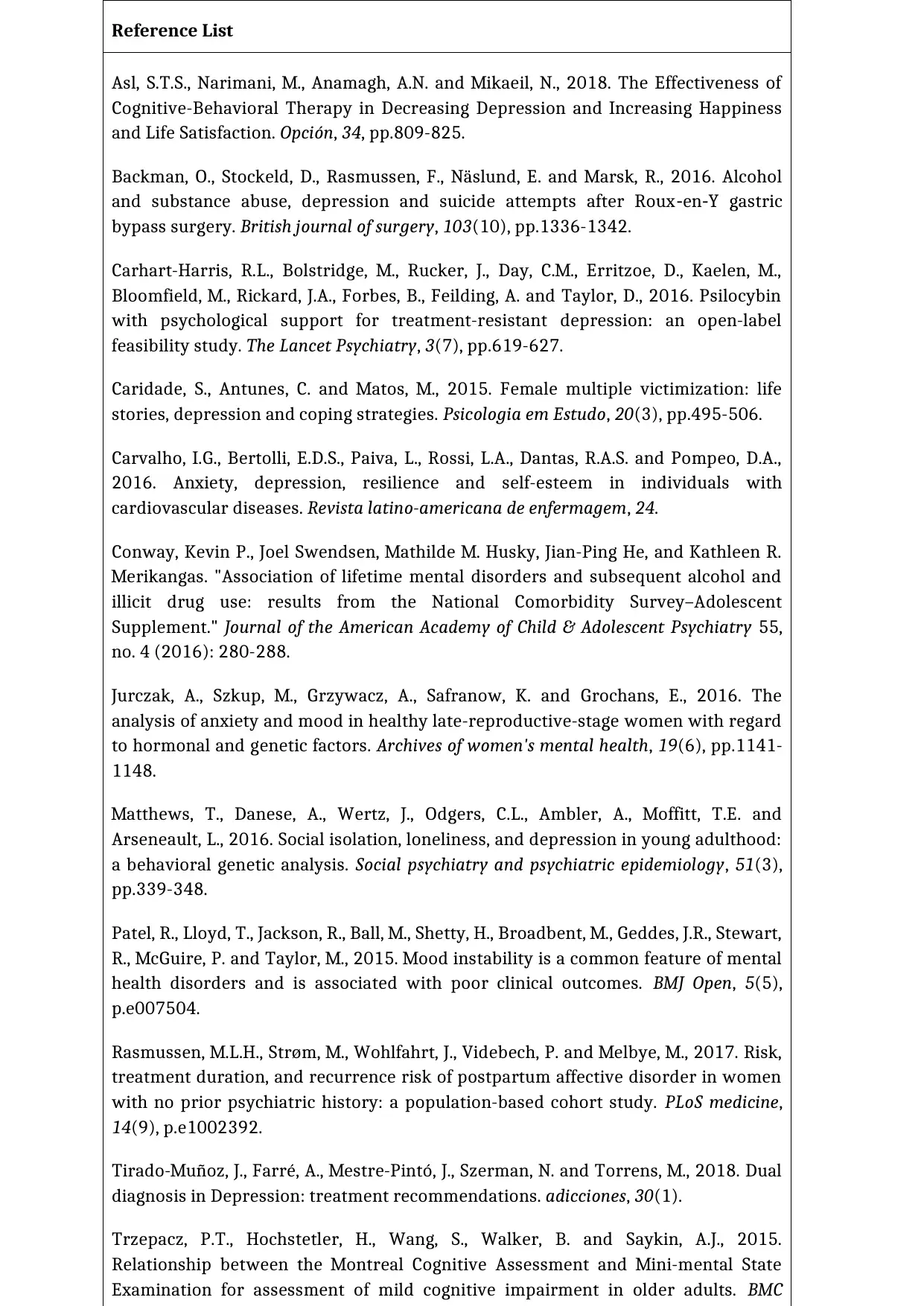
Reference List
Asl, S.T.S., Narimani, M., Anamagh, A.N. and Mikaeil, N., 2018. The Effectiveness of
Cognitive-Behavioral Therapy in Decreasing Depression and Increasing Happiness
and Life Satisfaction. Opción, 34, pp.809-825.
Backman, O., Stockeld, D., Rasmussen, F., Näslund, E. and Marsk, R., 2016. Alcohol
and substance abuse, depression and suicide attempts after Roux‐en‐Y gastric
bypass surgery. British journal of surgery, 103(10), pp.1336-1342.
Carhart-Harris, R.L., Bolstridge, M., Rucker, J., Day, C.M., Erritzoe, D., Kaelen, M.,
Bloomfield, M., Rickard, J.A., Forbes, B., Feilding, A. and Taylor, D., 2016. Psilocybin
with psychological support for treatment-resistant depression: an open-label
feasibility study. The Lancet Psychiatry, 3(7), pp.619-627.
Caridade, S., Antunes, C. and Matos, M., 2015. Female multiple victimization: life
stories, depression and coping strategies. Psicologia em Estudo, 20(3), pp.495-506.
Carvalho, I.G., Bertolli, E.D.S., Paiva, L., Rossi, L.A., Dantas, R.A.S. and Pompeo, D.A.,
2016. Anxiety, depression, resilience and self-esteem in individuals with
cardiovascular diseases. Revista latino-americana de enfermagem, 24.
Conway, Kevin P., Joel Swendsen, Mathilde M. Husky, Jian-Ping He, and Kathleen R.
Merikangas. "Association of lifetime mental disorders and subsequent alcohol and
illicit drug use: results from the National Comorbidity Survey–Adolescent
Supplement." Journal of the American Academy of Child & Adolescent Psychiatry 55,
no. 4 (2016): 280-288.
Jurczak, A., Szkup, M., Grzywacz, A., Safranow, K. and Grochans, E., 2016. The
analysis of anxiety and mood in healthy late-reproductive-stage women with regard
to hormonal and genetic factors. Archives of women's mental health, 19(6), pp.1141-
1148.
Matthews, T., Danese, A., Wertz, J., Odgers, C.L., Ambler, A., Moffitt, T.E. and
Arseneault, L., 2016. Social isolation, loneliness, and depression in young adulthood:
a behavioral genetic analysis. Social psychiatry and psychiatric epidemiology, 51(3),
pp.339-348.
Patel, R., Lloyd, T., Jackson, R., Ball, M., Shetty, H., Broadbent, M., Geddes, J.R., Stewart,
R., McGuire, P. and Taylor, M., 2015. Mood instability is a common feature of mental
health disorders and is associated with poor clinical outcomes. BMJ Open, 5(5),
p.e007504.
Rasmussen, M.L.H., Strøm, M., Wohlfahrt, J., Videbech, P. and Melbye, M., 2017. Risk,
treatment duration, and recurrence risk of postpartum affective disorder in women
with no prior psychiatric history: a population-based cohort study. PLoS medicine,
14(9), p.e1002392.
Tirado-Muñoz, J., Farré, A., Mestre-Pintó, J., Szerman, N. and Torrens, M., 2018. Dual
diagnosis in Depression: treatment recommendations. adicciones, 30(1).
Trzepacz, P.T., Hochstetler, H., Wang, S., Walker, B. and Saykin, A.J., 2015.
Relationship between the Montreal Cognitive Assessment and Mini-mental State
Examination for assessment of mild cognitive impairment in older adults. BMC
Asl, S.T.S., Narimani, M., Anamagh, A.N. and Mikaeil, N., 2018. The Effectiveness of
Cognitive-Behavioral Therapy in Decreasing Depression and Increasing Happiness
and Life Satisfaction. Opción, 34, pp.809-825.
Backman, O., Stockeld, D., Rasmussen, F., Näslund, E. and Marsk, R., 2016. Alcohol
and substance abuse, depression and suicide attempts after Roux‐en‐Y gastric
bypass surgery. British journal of surgery, 103(10), pp.1336-1342.
Carhart-Harris, R.L., Bolstridge, M., Rucker, J., Day, C.M., Erritzoe, D., Kaelen, M.,
Bloomfield, M., Rickard, J.A., Forbes, B., Feilding, A. and Taylor, D., 2016. Psilocybin
with psychological support for treatment-resistant depression: an open-label
feasibility study. The Lancet Psychiatry, 3(7), pp.619-627.
Caridade, S., Antunes, C. and Matos, M., 2015. Female multiple victimization: life
stories, depression and coping strategies. Psicologia em Estudo, 20(3), pp.495-506.
Carvalho, I.G., Bertolli, E.D.S., Paiva, L., Rossi, L.A., Dantas, R.A.S. and Pompeo, D.A.,
2016. Anxiety, depression, resilience and self-esteem in individuals with
cardiovascular diseases. Revista latino-americana de enfermagem, 24.
Conway, Kevin P., Joel Swendsen, Mathilde M. Husky, Jian-Ping He, and Kathleen R.
Merikangas. "Association of lifetime mental disorders and subsequent alcohol and
illicit drug use: results from the National Comorbidity Survey–Adolescent
Supplement." Journal of the American Academy of Child & Adolescent Psychiatry 55,
no. 4 (2016): 280-288.
Jurczak, A., Szkup, M., Grzywacz, A., Safranow, K. and Grochans, E., 2016. The
analysis of anxiety and mood in healthy late-reproductive-stage women with regard
to hormonal and genetic factors. Archives of women's mental health, 19(6), pp.1141-
1148.
Matthews, T., Danese, A., Wertz, J., Odgers, C.L., Ambler, A., Moffitt, T.E. and
Arseneault, L., 2016. Social isolation, loneliness, and depression in young adulthood:
a behavioral genetic analysis. Social psychiatry and psychiatric epidemiology, 51(3),
pp.339-348.
Patel, R., Lloyd, T., Jackson, R., Ball, M., Shetty, H., Broadbent, M., Geddes, J.R., Stewart,
R., McGuire, P. and Taylor, M., 2015. Mood instability is a common feature of mental
health disorders and is associated with poor clinical outcomes. BMJ Open, 5(5),
p.e007504.
Rasmussen, M.L.H., Strøm, M., Wohlfahrt, J., Videbech, P. and Melbye, M., 2017. Risk,
treatment duration, and recurrence risk of postpartum affective disorder in women
with no prior psychiatric history: a population-based cohort study. PLoS medicine,
14(9), p.e1002392.
Tirado-Muñoz, J., Farré, A., Mestre-Pintó, J., Szerman, N. and Torrens, M., 2018. Dual
diagnosis in Depression: treatment recommendations. adicciones, 30(1).
Trzepacz, P.T., Hochstetler, H., Wang, S., Walker, B. and Saykin, A.J., 2015.
Relationship between the Montreal Cognitive Assessment and Mini-mental State
Examination for assessment of mild cognitive impairment in older adults. BMC
⊘ This is a preview!⊘
Do you want full access?
Subscribe today to unlock all pages.

Trusted by 1+ million students worldwide

Paraphrase This Document
Need a fresh take? Get an instant paraphrase of this document with our AI Paraphraser
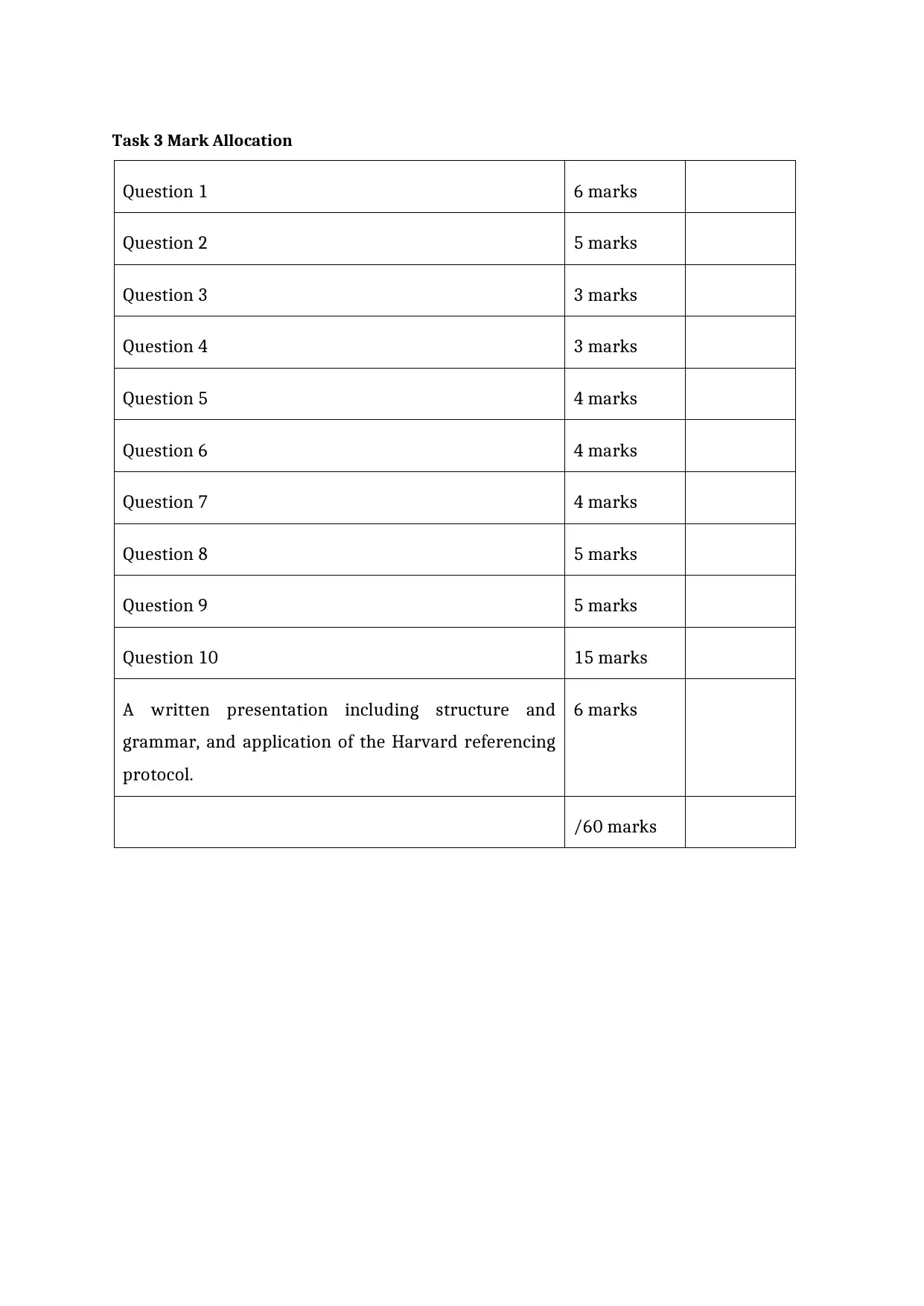
Task 3 Mark Allocation
Question 1 6 marks
Question 2 5 marks
Question 3 3 marks
Question 4 3 marks
Question 5 4 marks
Question 6 4 marks
Question 7 4 marks
Question 8 5 marks
Question 9 5 marks
Question 10 15 marks
A written presentation including structure and
grammar, and application of the Harvard referencing
protocol.
6 marks
/60 marks
Question 1 6 marks
Question 2 5 marks
Question 3 3 marks
Question 4 3 marks
Question 5 4 marks
Question 6 4 marks
Question 7 4 marks
Question 8 5 marks
Question 9 5 marks
Question 10 15 marks
A written presentation including structure and
grammar, and application of the Harvard referencing
protocol.
6 marks
/60 marks
1 out of 11
Related Documents
Your All-in-One AI-Powered Toolkit for Academic Success.
+13062052269
info@desklib.com
Available 24*7 on WhatsApp / Email
![[object Object]](/_next/static/media/star-bottom.7253800d.svg)
Unlock your academic potential
Copyright © 2020–2026 A2Z Services. All Rights Reserved. Developed and managed by ZUCOL.




